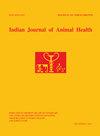通过营养干预减轻家畜的寒冷压力:全面回顾
IF 0.4
4区 农林科学
Q4 AGRICULTURE, DAIRY & ANIMAL SCIENCE
引用次数: 0
摘要
气候变化已成为全球畜牧系统可持续性的主要威胁。气候变化引发了许多应激因素,例如寒冷、炎热、潮湿、雨水、冰雪和大风,这些应激因素会直接或间接影响内分泌系统,并影响动物的表现,包括其生产潜力、生殖系统和正常的发情周期。此外,环境应激因素也会导致动物易受感染;因此,了解应激因素如何改变动物的适应能力以及应对应激的有效方法至关重要。本综述旨在提供有关寒冷应激所带来的挑战及其通过营养干预措施缓解的可能性的科学证据。寒冷是最潜在的环境应激之一,会对动物的生产潜力和生长产生不利影响。在寒冷胁迫下,动物的饮食摄入量会增加,但生产能力却会下降,而且还会导致生理波动、行为转变、组织和肠道受损以及死亡率飙升。保持动物处于热平衡区非常重要,否则任何偏离都会危及生命。因此,为了减少经济损失,必须及时采取措施,防止应激源造成的损害。因此,为了保持生产性能和盈利能力,建议采用科学的饲养方法,并添加饲料补充剂(尤其是维生素和矿物质),以抵御冷应激的破坏性影响。本文章由计算机程序翻译,如有差异,请以英文原文为准。
Mitigating Cold Stress in Livestock by Nutritional Interventions: A Comprehensive Review
Climate change has been the major threat to livestock systems sustainability globally. This climate change has provoked many stressors, for instance, cold, heat, humidity, rain, ice and wind, that can directly or indirectly exert influence on the endocrine system and impact the performance of an animal including their production potential, reproductive system and regular estrous cycle. Also, the environmental stressors can contribute to the amenability of animals to infections; it is therefore, vital to understand how stressors alter the animal’s adaptive capacity and efficient methods in coping stress. This review aims at the scientific evidences regarding challenges due to cold stress and its potential mitigation by nutritional interventions. The cold is amongst the most potential environmental stressors which can adversely affect production potential as well as the growth of animals. Under cold stress the animals’ dietary intake increases, but the production capacity declines, furthermore, it can also culminate in physiological fluctuations, behavioral shift, tissue and intestinal impairment and soaring death rate. Maintenance of animal in its thermoneutral zone is important, otherwise any deviation from it proves life threatening. So, to cut back on the economic losses timely course of action must be taken to prevent the damages ascribed to the stressor. To maintain the production performance along with profitability, it is thus recommended to adapt scientific feeding regimens and also incorporate feed supplements (especially vitamins and minerals) to combat the devastating effects of cold stress.
求助全文
通过发布文献求助,成功后即可免费获取论文全文。
去求助
来源期刊

Indian Journal of Animal Research
AGRICULTURE, DAIRY & ANIMAL SCIENCE-
CiteScore
1.00
自引率
20.00%
发文量
332
审稿时长
6 months
期刊介绍:
The IJAR, the flagship print journal of ARCC, it is a monthly journal published without any break since 1966. The overall aim of the journal is to promote the professional development of its readers, researchers and scientists around the world. Indian Journal of Animal Research is peer-reviewed journal and has gained recognition for its high standard in the academic world. It anatomy, nutrition, production, management, veterinary, fisheries, zoology etc. The objective of the journal is to provide a forum to the scientific community to publish their research findings and also to open new vistas for further research. The journal is being covered under international indexing and abstracting services.
 求助内容:
求助内容: 应助结果提醒方式:
应助结果提醒方式:


